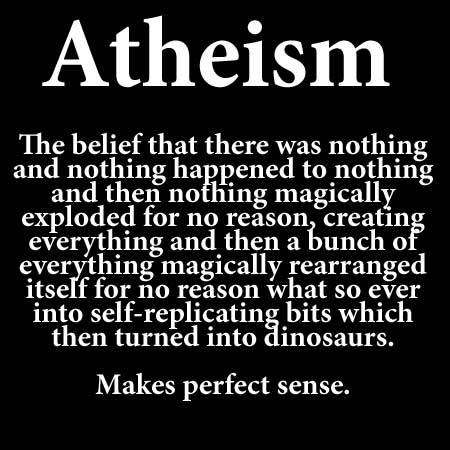I’m not exactly brimming with skill when it comes to figuring out what a bunch of people are thinking. I’m usually among the last to do that within any given setting, and when I arrive at a conclusion about this I’m very often wrong. But there is a great deal of hard evidence around us, it seems to me, that atheism is popular lately. Hugely popular. Either that, or our atheists are getting much louder about their atheism. One way or t’other, the atheistic noise is hitting a crescendo.
Well, that’s quite alright with me. I’ve got a blog, which has my opinions about things written in it, and I’m certainly not about to upbraid someone else for coming to a conclusion about something and then voicing that conclusion. It’s exactly what I do. Should there somehow be an urgent need to condemn this by itself, I’ll take one step backward with everybody else, and let someone else volunteer to do the condemning. I’m unfit.
Having said that, though, I can’t help noticing something. The atheists I have seen lately, don’t behave the way I do. I may believe in God, but there are other things in which I don’t believe. Some of which I don’t discuss often at all.
Let’s come up with an example…the lottery. The lottery, to me, is the very embodiment of issues that are 1) decided by individuals according to their personal values, and 2) relatively insignificant, insofar as the necessity they present for winning converts. In other words, if I were to recognize a compelling need to get as many people as possible to look at the lottery the way I look at the lottery — why, I would have to get cracking. Goodness gracious. What a lot of work I’d have ahead of me. Everyone I know, I daresay, plays that damned lottery.
And I do have my little monologues to deliver on such a thing. There’s not much point to them, though, because the judgment to be made from their content, is limited to things I shall or shall not do by myself. So…I have a blog with a zillion posts in it about this-or-that, and my beliefs about the lottery don’t end up anywhere in it. Not very often, anyway.
Other people want to do something different from what I would do, because they get fun out of it. I respect that. Others really and truly think this might be the one…and I don’t see much point in trying to talk sense into them. When the office collects for the pool on Fridays, I decline politely, and quietly. Pressed for a reason, occasionally I will make up something silly about a made-up religious denomination frowning on lotteries. Anything to be left-alone on the matter. The monologues stay under wraps, until such time as someone indicates they want to hear them. And then after I recite them, the usual outcome is I’m heckled in some good-natured roasting horseshoe arrangement.
Think of Reservoir Dogs: Mister Pink doesn’t believe in tipping. It’s like that. Except I don’t talk as loud about lotteries as Steve Buscemi does about tipping.
This is not how our atheists talk about God, I notice.
Simply put, they don’t treat it as a personal decision. They treat it as a community policy decision. I mean, the loudest ones treat it that way. Consider the case of Intelligent Design from two summers ago, when President Bush went on record to say both sides should be taught in school. Both sides, meaning…evolution, and the hated Intelligent Design.
This touched off a firestorm.
Why? I dunno.
I don’t believe in the lottery, but if someone else does, fine. If they wanna teach their little sweetums’ that no weekend is complete without the purchase of one or several lottery tickets, that’s just great. Teach them in the public schools…I’m down with that, too. It wouldn’t be in the curriculum I’d put together. But hey. Takes all kinds.
See, I just don’t like to play it. I don’t think it works out in the long term. I think it’s entertainment…people should be willing to admit that’s what it is. That is all it is.
Now if I’m right about that…and the little crumb-crunchers have been taught how to think — not what to think, but how to think — eventually, they’ll come ’round to my way of thinking. If I’m wrong, well, I’m still just on the heavy side of forty. There’s still time, maybe I’ll come ’round to theirs.
But I don’t care if, in their elementary-school years, the little curtain-climbers are given a good intellectual shove off in my direction. It doesn’t matter to me one little bit.
Our atheists, laying their naturally-selected eyeballs upon an instance they might, by some stretch, be able to call “Creationism,” see a threat. Oh horrors, the next generation might not believe as we do. They act like this is some form of genocide. Simply to allow both sides.
And then they uphold themselves as the guardians of logic, while inflicting incendiary broadside attacks upon that logic. Case in point is Jerry Coyne’s essay from that tumultuous time, The Faith That Dare Not Speak Its Name. The point to this is that Intelligent Design is simply Creationism masquerading under a different label. And as Intelligent Design went on trial subsequently, there was ironclad evidence that this is indeed the case. Someone tried to get Creationism into the classrooms, they were struck down, and they tried again by turning Creationism into Intelligent Design.
Mmmkay. So the material was rejected because it was too Judeo-Christian, so someone made it less denominationally-flavorful and gave ‘er another go. Seems sensible to me. But Coyne’s argument is essentially that these insidious forces should be silenced forever because their intent remains the same.
Okay. But with a little bit of innocent scope creep, Coyne meanders from his mainstream argument of pure paranoia, down a bunny-trail of reason and logic and relatively solid common sense. And in crafting the argument about why we should all be so enlightened as to not hear any of this, he presents a few tidbits I personally find fascinating:
Consider the eye. Creationists have long maintained that it could not have resulted from natural selection, citing a sentence from On the Origin of Species: “To suppose that the eye with all its inimitable contrivances for adjusting the focus to different distances, for admitting different amounts of light, and for the correction of spherical and chromatic aberration, could have been formed by natural selection, seems, I freely confess, absurd in the highest degree.” But in the next passage, invariably omitted by creationists, Darwin ingeniously answers his own objection:
Reason tells me, that if numerous gradations from a simple and imperfect eye to one complex and perfect can be shown to exist, each grade being useful to its possessor, as is certainly the case; if further, the eye ever varies and the variations be inherited, as is likewise certainly the case and if such variations should be useful to any animal under changing conditions of life, then the difficulty of believing that a perfect and complex eye could be formed by natural selection, though insuperable by our imagination, should not be considered as subversive of the theory.
Thus our eyes did not suddenly appear as full-fledged camera eyes, but evolved from simpler eyes, having fewer components, in ancestral species. Darwin brilliantly addressed this argument by surveying existing species to see if one could find functional but less complex eyes that not only were useful, but also could be strung together into a hypothetical sequence showing how a camera eye might evolve. If this could be done – and it can – then the argument for irreducible complexity vanishes, for the eyes of existing species are obviously useful, and each step in the hypothetical sequence could thus evolve by natural selection.
See, we’ve lost track of what the argument is about, and both sides are much better off for it. It turns out — questions about how we got here, and what the evidence has to say about how we got here and how we didn’t, are all fascinating, and endlessly complicated and involved. I think Coyne has done everybody a wonderful service by inspecting, at least at a cursory level, something about which so many other authorities would just as soon keep their silence.
Well, I’d rather know about it. And if the argument is about whether the childrunz ought to be taught all this stuff or not, I’m sold. They’ll learn not only about eyeballs and nerves, they’ll learn about people. I don’t see the downside. I know Coyne wants me to see one. But he’s made a compelling, bulletproof case that President Bush was right. If the proposal were not on the table for both sides to be taught, I wouldn’t have learned this fascinating stuff.
One thing though. “If this could be done – and it can – then the argument for irreducible complexity vanishes…” This is a mishandling of logic, and it’s kind of disturbing that a University of Chicago professor would indulge in it. Although I suppose we all are human and we all have our prejudices.
Prof. Coyne, here, is transgressing against Blogger friend Phil’s Thing I Know #6: “The mere fact that plausible argument can be made does not mean that its conclusion is valid.” Perhaps it would have been more accurate to say, if Intelligent Design were an ineluctable conclusion prior to the investigation of these variations-of-eyeballs, then after such investigations, it no longer is.
That would be a clumsy wording. But it would be accurate. Prof. Coyne will have none of it, though. In his world, the argument has vanished. Should an argument be friendly to his side of things, once such an argument is shown to be plausible, this is as good as proof.
It’s simply not a healthy way to noodle things out. And in Ann Coulter’s book from a year ago, Godless, this is the chink in the Darwin armor that she exploits mercilessly throughout the final third of it.
But if a lot of people want to run around, coloring outside the lines of Phil’s Thing I Know #6, I think we can survive that. To rigidly pursue the finer rules of logic to the extent you can learn about why we’re here and how the world works, that is a completely different thing from figuring out how to put your pants on one leg at a time. Scientists should follow science. Non-scientists can do what they want.
But the other trend is mighty disturbing. People who do not believe in God…lately…have begun to apply intelligence tests to strangers. Pass-fail intelligence tests. You are a blithering idiot if you believe in the “Sky Fairies.” And if you’re a good, righteous, straight and true atheists — one must restrain onesself from tossing in “God-fearing” — then maybe you have something working between your ears.
It is a breathtakingly simple illustration of circular reasoning, with a little bit of third-grade playground name-calling thrown in. There can be no God, because everyone who believes in Him is a stupid chucklehead. And I know they are stupid chuckleheads, because they believe in God.
Based on what I’ve seen, even that summation goes beyond the “logic” atheists have been using to arrive at their atheism. I have to confess, I nurse strong doubts about logic having anything to do with it.
If I were pressed to comment on a cause for this widespread atheism, I blame video games.
I think the atheists were once children, and their childhoods were filled with Sundays. It was time to go to church, they had to put down the controller and go to church, and they just didn’t wanna. Conflict arose. And they became atheists.
That’s as complicated as it gets. I can’t prove it. But I’m convinced.
If, when video games were starting to hit their stride in the early nineties…back then, you were about thirteen years old — you are twenty-seven or twenty-eight now. This is the face of the twenty-first century atheist. He’s a grown-up child who didn’t want to hit “save” and stop playing Super Mario 64 long enough to go to church for an hour or two. And this has molded and shaped his perception of whether there is a God or not. Eyeballs and finch beaks have nothing to do with it. Coyne, preaching to his choir, might have saved himself the trouble and avoided all that hard science; they don’t care.
They want what they want when they want it. They like beer, Cheese-Whiz straight outta the can, Gears Of War, and as much sex as they can get.
Simply put, God hasn’t seen fit to show what He can bring to the table in bringing them all that stuff.
Which is perfectly okay by me. I just wish our video-game atheists would abstain from believing in God — quietly — just as I abstain from buying lottery tickets. Because if I understand the overall argument correctly…it has something to do with everyone living their lives as they see fit, without interference from others. Right?










 We sometimes embrace a spirit of community to correct mistakes for each other. Like, for example, you could confuse “health care reform” with a process of corrupt politicians washing each others’ backsides, making closed-door deals to get “The Legislation” passed. If you can fall for that, then as an individual you can make mistakes, which it’s up to the community to then correct.
We sometimes embrace a spirit of community to correct mistakes for each other. Like, for example, you could confuse “health care reform” with a process of corrupt politicians washing each others’ backsides, making closed-door deals to get “The Legislation” passed. If you can fall for that, then as an individual you can make mistakes, which it’s up to the community to then correct. The conservative viewpoint is different…and yes, it has a relationship with Christianity, even among conservatives who happen to be atheists. It says, since we’re all descended from Adam, we are all tainted. Like the reality-teevee guy said, the tainting is conceptually uniform, and places us on a unifying, level egalitarian plane. So no, this layering of Special People versus plain ordinary hoi polloi, this just isn’t going to work.
The conservative viewpoint is different…and yes, it has a relationship with Christianity, even among conservatives who happen to be atheists. It says, since we’re all descended from Adam, we are all tainted. Like the reality-teevee guy said, the tainting is conceptually uniform, and places us on a unifying, level egalitarian plane. So no, this layering of Special People versus plain ordinary hoi polloi, this just isn’t going to work. It has a lot to do with something called “love”; that’s why you have to immediately stop torturing terrorists, and that of course means you have to stop doing anything that anybody, anywhere, no matter how recklessly, might label “torture.” Pretty much just feed ’em three times a day, fluff up their pillows, find out what else they want from you, go get it, and wait for them to talk. Police shouldn’t hurt criminals, and probably shouldn’t even arrest them for anything either. Countries shouldn’t go to war, no matter the reason. Make-love-not-war.
It has a lot to do with something called “love”; that’s why you have to immediately stop torturing terrorists, and that of course means you have to stop doing anything that anybody, anywhere, no matter how recklessly, might label “torture.” Pretty much just feed ’em three times a day, fluff up their pillows, find out what else they want from you, go get it, and wait for them to talk. Police shouldn’t hurt criminals, and probably shouldn’t even arrest them for anything either. Countries shouldn’t go to war, no matter the reason. Make-love-not-war. That is not what we’re hearing now, when it is the conservatives and Republicans who got their own butt cheeks extended to them upon a silver platter. Now, things are different. No need to repackage anything; it is the contents within that have to be filtered out, organized, purified…purged.
That is not what we’re hearing now, when it is the conservatives and Republicans who got their own butt cheeks extended to them upon a silver platter. Now, things are different. No need to repackage anything; it is the contents within that have to be filtered out, organized, purified…purged. This is a list of
This is a list of